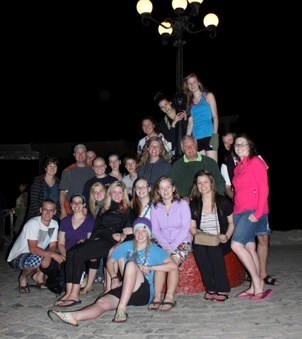Recent warm weather notwithstanding, our Februaries are usually cold slogs through snow and long, desolate nights.
Canadians do what they can to escape to sunnier, warmer climes, spending small fortunes on resort trips and cruises. Twelve students from John Paul II, along with chaperones, also made a trip south this February, but did so to change the world rather than escape winter.
The group prepared seriously before leaving Canada. Eight of the 12 in the group had gone with the mission club to Calgary and Edmonton to live with the homeless for a day, and the 12 that were eventually chosen were picked from a pool of around 100 applications. Applicants had to be ready to commit to 10 months of preparation, and even now that they are back in Canada, they will continue to meet until June.
After two previous attempts to go to Mexico to do mission work were thwarted by ongoing violence, the team decided on a new destination. Peru was chosen for this year's trip because of the country's large Catholic population and because the school had a connection there in the person of Luciano, a young local activist who had worked with a school in Saskatoon.
The long journey to Peru was the inaugural mission trip undertaken by the school. For all of the trip participants, Lima was a shock. None of them had been to a Third World country before, and one third of Peru's inhabitants are considered poor. Lima itself is impossibly large by Canadian standards, at around nine million. Though every participant had taken basic Spanish classes before coming to the country, it did not allow them to carry on conversations with Peruvians. Much of their discussions took place with hand gestures as much as spoken words.
The conditions of the slum where they worked were unimaginable - entire families living in single-room dwellings built from whatever supplies the residents could find, along with a profound lack of space and running water. What little clean water residents had needed to be hauled in buckets up a steep mountain slope. Though TV and their Christian Ethics class had helped students prepare mentally for the experience of seeing the slums for the first time, it was nevertheless a shock.
But the team adapted admirably to the adverse conditions. Roxanne Stynsky, one of the advisors for the trip, explained "the kids and the advisors were very tolerant of the conditions there, there was nobody that even complained about the building of the stairs or working in rough or hot conditions."
In their limited time in Peru, the team built steps up a steep slope, ran a dental clinic to teach local children about oral hygiene, took local children to see the larger city and conducted faith camps. The locals were extremely supportive, Stynsky said, and team members were touched by the Peruvian reaction to their work.
"It was really great to see how grateful they were just for a toothbrush, because they might not have owned one before," observed Makenna Cameron, who was on the team.
The local community also helped them in their step-building efforts, and even threw a modest going-away party for the group. One member of the community managed to learn everyone's name in the brief time they were there.
Though the mission group went to Peru to give to the locals, they came away from the experience wiser and more knowledgeable. Though the poverty was a shock, what was almost more shocking was the happiness and pride the locals had.
Stynsky explained she had "assumed that if you have so little and if life is difficult, that you're going to be sad all the time, you're going to be upset. When we don't get something, we're upset. They don't have some of the bare minimums, and they were happy."
The children of the slums, despite having no space in which to play, were described as incredibly energetic and full of enthusiasm.
Though they are back in Canada, the team's work is far from done. They have been making presentations in schools, at churches and have been explaining, to everyone around them, the purpose of the trip and its impact. Their presentations have inspired other schools in the community to fundraise for other communities around the world. Plans are already in the works to organize an adult trip to the region.
But the trip also changed them personally. In their own words, it has strengthened their faith, and given them a new "family" in the form of the mission group. It has made our essential similarity as a species, our relationship as God's children, more tangible and real.
And it has made them cherish the "stuff" that they have here more.




